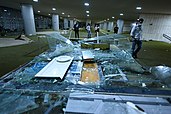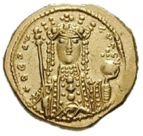From today's featured article
Combe Hill is a causewayed enclosure, near Eastbourne in East Sussex, on the northern edge of the South Downs. It consists of an inner circuit of ditch and bank, incomplete where it meets a steep slope on its north side, and the remains of an outer circuit. Causewayed enclosures were built in England from shortly before 3700 BC until at least 3500 BC; their purpose is not known. The enclosure has been excavated twice: in 1949, by Reginald Musson; and in 1962, by Veronica Seton-Williams, who used it as a training opportunity for volunteers. Charcoal fragments from Musson's dig were later dated to between 3500 and 3300 BC. Musson also found a large quantity of Ebbsfleet ware pottery in one of the ditches. Seton-Williams found three polished stone axes deposited in another ditch, perhaps not long after it had been dug. The site is only 800 metres (870 yd) from Butts Brow, another Neolithic enclosure; both sites may have seen Neolithic activity at the same time. ( Full article...)
Did you know ...
- ... that a number of early medieval Irish bell shrines (example pictured) were probably hidden in bogs or church walls to save them from Viking raiders?
- ... that after being benched at quarterback, Jackson State Tigers football player T. C. Taylor changed his position and became a record-setting wide receiver?
- ... that Canadian poets Milton Acorn, Margaret Atwood, and Gwendolyn MacEwen performed at the Bohemian Embassy on the same bill as burlesque dancer Libby Jones?
- ... that American teacher Marc Fogel was sentenced to 14 years in Russian prison for possessing a small amount of marijuana, but has gotten little public attention compared to Brittney Griner?
- ... that the dinosaur Bashunosaurus was first mentioned in a scientific paper in 1989, but was only formally named in 2004?
- ... that Patty Loveless's musical career rebounded after she underwent surgery to repair a blood vessel on her vocal cords?
- ... that Monaco GP was the most popular arcade driving game in the United States in 1981?
- ... that Walter von Pückler earned the nickname Dreschgraf ('Thrashing Count') due to his frequent use of violent, antisemitic language?
In the news
- Supporters of former Brazilian president Jair Bolsonaro invade the National Congress (damage pictured), the Supreme Federal Court, and the Palácio do Planalto.
- Michael Smith wins the PDC World Darts Championship.
- Croatia adopts the euro and joins the Schengen Area.
- Pope Emeritus Benedict XVI dies at the age of 95.
- Brazilian footballer Pelé dies at the age of 82.
On this day
January 11: Prithvi Jayanti in Nepal
- 1055 – Theodora Porphyrogenita (pictured) became the sole ruler of the Byzantine Empire after the death of her brother-in-law Constantine IX Monomachos.
- 1787 – German-born British astronomer William Herschel discovered two Uranian moons, later named Oberon and Titania by his son John.
- 1863 – American Civil War: The Battle of Arkansas Post concluded with the Union Army capturing a fort from Confederate forces near the mouth of the Arkansas River.
- 1923 – Troops from France and Belgium invaded the Ruhr to force the Weimar Republic to pay reparations in the aftermath of World War I.
- 2013 – French special forces failed in an attempted rescue of a DGSE agent, who had been taken hostage in 2009 by al-Shabaab, in Bulo Marer, Somalia.
- Domenico Ghirlandaio ( d. 1494)
- Bayard Taylor ( b. 1825)
- Peter Badcoe ( b. 1934)
Today's featured picture

|
|
The plate carrée projection is a map projection in which the horizontal coordinate is the longitude and the vertical coordinate is the latitude. The name derives from the French for "flat square". The plate carrée is a special case of the equirectangular projection, which has been in use since the earliest days of spherical cartography: the Roman mathematician Ptolemy attributed its invention to Marinus of Tyre, in around AD 100. This composite satellite image, titled "Blue Marble", was produced by NASA and shows Earth's land surface, shallow water and shaded topography. Photograph credit: NASA
Recently featured:
|
Other areas of Wikipedia
- Community portal – The central hub for editors, with resources, links, tasks, and announcements.
- Village pump – Forum for discussions about Wikipedia itself, including policies and technical issues.
- Site news – Sources of news about Wikipedia and the broader Wikimedia movement.
- Teahouse – Ask basic questions about using or editing Wikipedia.
- Help desk – Ask questions about using or editing Wikipedia.
- Reference desk – Ask research questions about encyclopedic topics.
- Content portals – A unique way to navigate the encyclopedia.
Wikipedia's sister projects
Wikipedia is written by volunteer editors and hosted by the Wikimedia Foundation, a non-profit organization that also hosts a range of other volunteer projects:
-
Commons
Free media repository -
MediaWiki
Wiki software development -
Meta-Wiki
Wikimedia project coordination -
Wikibooks
Free textbooks and manuals -
Wikidata
Free knowledge base -
Wikinews
Free-content news -
Wikiquote
Collection of quotations -
Wikisource
Free-content library -
Wikispecies
Directory of species -
Wikiversity
Free learning tools -
Wikivoyage
Free travel guide -
Wiktionary
Dictionary and thesaurus
Wikipedia languages
This Wikipedia is written in English. Many other Wikipedias are available; some of the largest are listed below.
-
1,000,000+ articles
-
250,000+ articles
-
50,000+ articles
From today's featured article
Combe Hill is a causewayed enclosure, near Eastbourne in East Sussex, on the northern edge of the South Downs. It consists of an inner circuit of ditch and bank, incomplete where it meets a steep slope on its north side, and the remains of an outer circuit. Causewayed enclosures were built in England from shortly before 3700 BC until at least 3500 BC; their purpose is not known. The enclosure has been excavated twice: in 1949, by Reginald Musson; and in 1962, by Veronica Seton-Williams, who used it as a training opportunity for volunteers. Charcoal fragments from Musson's dig were later dated to between 3500 and 3300 BC. Musson also found a large quantity of Ebbsfleet ware pottery in one of the ditches. Seton-Williams found three polished stone axes deposited in another ditch, perhaps not long after it had been dug. The site is only 800 metres (870 yd) from Butts Brow, another Neolithic enclosure; both sites may have seen Neolithic activity at the same time. ( Full article...)
Did you know ...
- ... that a number of early medieval Irish bell shrines (example pictured) were probably hidden in bogs or church walls to save them from Viking raiders?
- ... that after being benched at quarterback, Jackson State Tigers football player T. C. Taylor changed his position and became a record-setting wide receiver?
- ... that Canadian poets Milton Acorn, Margaret Atwood, and Gwendolyn MacEwen performed at the Bohemian Embassy on the same bill as burlesque dancer Libby Jones?
- ... that American teacher Marc Fogel was sentenced to 14 years in Russian prison for possessing a small amount of marijuana, but has gotten little public attention compared to Brittney Griner?
- ... that the dinosaur Bashunosaurus was first mentioned in a scientific paper in 1989, but was only formally named in 2004?
- ... that Patty Loveless's musical career rebounded after she underwent surgery to repair a blood vessel on her vocal cords?
- ... that Monaco GP was the most popular arcade driving game in the United States in 1981?
- ... that Walter von Pückler earned the nickname Dreschgraf ('Thrashing Count') due to his frequent use of violent, antisemitic language?
In the news
- Supporters of former Brazilian president Jair Bolsonaro invade the National Congress (damage pictured), the Supreme Federal Court, and the Palácio do Planalto.
- Michael Smith wins the PDC World Darts Championship.
- Croatia adopts the euro and joins the Schengen Area.
- Pope Emeritus Benedict XVI dies at the age of 95.
- Brazilian footballer Pelé dies at the age of 82.
On this day
January 11: Prithvi Jayanti in Nepal
- 1055 – Theodora Porphyrogenita (pictured) became the sole ruler of the Byzantine Empire after the death of her brother-in-law Constantine IX Monomachos.
- 1787 – German-born British astronomer William Herschel discovered two Uranian moons, later named Oberon and Titania by his son John.
- 1863 – American Civil War: The Battle of Arkansas Post concluded with the Union Army capturing a fort from Confederate forces near the mouth of the Arkansas River.
- 1923 – Troops from France and Belgium invaded the Ruhr to force the Weimar Republic to pay reparations in the aftermath of World War I.
- 2013 – French special forces failed in an attempted rescue of a DGSE agent, who had been taken hostage in 2009 by al-Shabaab, in Bulo Marer, Somalia.
- Domenico Ghirlandaio ( d. 1494)
- Bayard Taylor ( b. 1825)
- Peter Badcoe ( b. 1934)
Today's featured picture

|
|
The plate carrée projection is a map projection in which the horizontal coordinate is the longitude and the vertical coordinate is the latitude. The name derives from the French for "flat square". The plate carrée is a special case of the equirectangular projection, which has been in use since the earliest days of spherical cartography: the Roman mathematician Ptolemy attributed its invention to Marinus of Tyre, in around AD 100. This composite satellite image, titled "Blue Marble", was produced by NASA and shows Earth's land surface, shallow water and shaded topography. Photograph credit: NASA
Recently featured:
|
Other areas of Wikipedia
- Community portal – The central hub for editors, with resources, links, tasks, and announcements.
- Village pump – Forum for discussions about Wikipedia itself, including policies and technical issues.
- Site news – Sources of news about Wikipedia and the broader Wikimedia movement.
- Teahouse – Ask basic questions about using or editing Wikipedia.
- Help desk – Ask questions about using or editing Wikipedia.
- Reference desk – Ask research questions about encyclopedic topics.
- Content portals – A unique way to navigate the encyclopedia.
Wikipedia's sister projects
Wikipedia is written by volunteer editors and hosted by the Wikimedia Foundation, a non-profit organization that also hosts a range of other volunteer projects:
-
Commons
Free media repository -
MediaWiki
Wiki software development -
Meta-Wiki
Wikimedia project coordination -
Wikibooks
Free textbooks and manuals -
Wikidata
Free knowledge base -
Wikinews
Free-content news -
Wikiquote
Collection of quotations -
Wikisource
Free-content library -
Wikispecies
Directory of species -
Wikiversity
Free learning tools -
Wikivoyage
Free travel guide -
Wiktionary
Dictionary and thesaurus
Wikipedia languages
This Wikipedia is written in English. Many other Wikipedias are available; some of the largest are listed below.
-
1,000,000+ articles
-
250,000+ articles
-
50,000+ articles



